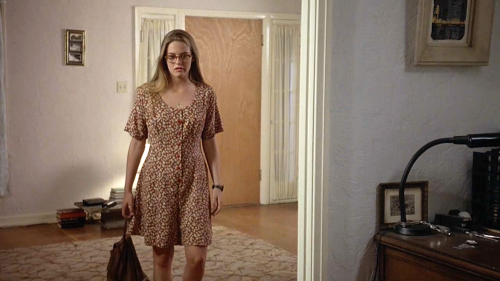
Mary (Alicia Silverstone) is a senior at a Catholic high school whose one ambition is to be a cop just like her dad who gave his life in the line of duty. When a serial killer murders her friend’s sister, the true crime obsessed Mary begins her own unofficial investigation much to the chagrin of her late father’s best buddy Det. Guinn (Bill Nunn). Mary’s turn as Nancy Drew leads her to a carnival and a police cadet named Campbell (Kevin Dillon) who she enlists to help her solve the case. But as the high school senior begins to fall for the cadet, he becomes ever more suspicious and is perhaps the killer himself.
True Crime (1996) is very much a gritty take on Nancy Drew for the nineties. The plot is brimming over with red herrings and misdirections to the point that the details of the case being built become totally obscured. Although competently directed by Pat Verducci he never really manages to capitalize on the inherent suspense of his own original screenplay. This leaves True Crime, from a stylistic stand point, a rather toothless thriller better suited for television.
But the mystery and suspense of True Crime are almost secondary to the portrait of adolescence represented by Mary. Usually in a thriller when the protagonist wants to be a cop that protagonist is male and set on a quest for vengeance or closure on behalf of the fallen paternal figure. True Crime subverts that trope with Mary. In fact the entire dramatic economy of the thriller genre is turned towards telling Mary’s coming-of-age story. Consider that Mary, on her first case, is self actualizing her professional desires while simultaneously exploring her sexual desires. As much as True Crime is a film about a mystery, it is a film about self-discovery.
Even the rather predictable plot twist of revealing the love interest to be the bad guy works towards this end. Campbell is Mary’s Angel/Angelus, her John Willoughby, her Robert Lovelace. Male authority figures are constantly reminding Mary that she’s dealing with the “real world” which, as suggested above, is as much about the predatory practices of patriarchal culture and misogyny as it is about crime scenes and motives. It’s this take on the Nancy Drew formula that makes True Crime incredible rather than mediocre.
The issue with True Crime is that this fusion of genres and styles is so subtle that it could very well be unintentional. Regardless, audiences and critics seem to have gone into True Crime with strong pre-conceived notions of what it should be and dismissed it outright as a failure when it was something else. This isn’t to say that True Crime is some unheralded masterpiece, but it does deserve to be re-evaluated.
